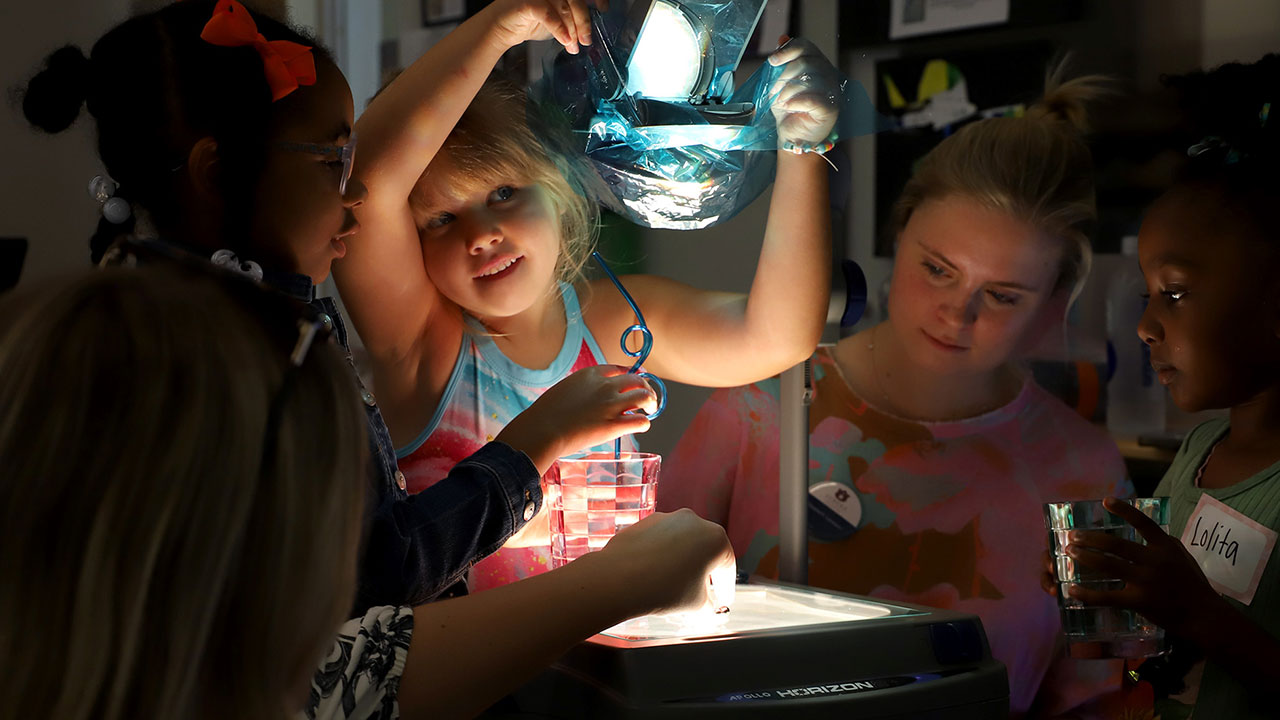content body

Auburn’s College of Education has been buzzing with creativity and exploration this summer through the 2025 Early Childhood Summer Enrichment Program in the college’s new building.
Led by College of Education Associate Professor Sean Durham, the program—“The Technologies of Childhood: Exploring the Art and Science of Early Learning”—welcomed preschoolers ages 4–6 into a vibrant, play-based learning environment. Each morning for the past few weeks, children have jumped into hands-on activities that blended science, art and free play, guided by Auburn’s early childhood teacher candidates.
"Our early childhood program is based upon an image of the child as competent, capable and deserving of educational opportunities that align to the child’s innate desire to wonder, solve problems and create,” Durham said. “The teacher education students have created in our laboratory classroom beautiful opportunities that have captured the children’s imaginations and sparked their investigations into several interesting topics this summer."
The program has emphasized child-led discovery, with students observing play and tailoring experiences.
"They have also utilized a powerful tool for developing curriculum – following children’s interests,” Durham said. "For example, one child was sharing his skill in making paper airplanes with the other children. This interest in planes has allowed the teachers to work with the children to infuse learning standards into an in-depth study of planes, how they fly, the designs of airports and the details of air travel. They have represented their knowledge using multiple types of art media and have even begun construction on a large size replica of an airplane.”
College of Education Early Childhood student Braxton Vinson said the enrichment program has been a great learning experience.
"During my summer practicum with SEP, I feel that I am growing exponentially as a teacher,” Vinson said. "This summer, I have begun to reflect more on my approach to teaching; furthermore, I have a clearer insight into why teachers prepare lessons beforehand, how a curriculum can be founded from children’s interests and how observing a child interacting can be just as valuable as meaningful conversations. Finally, as someone who primarily works by themselves, the collaboration between my peers and professors has made me much more aware of areas I can improve upon to become the premier teacher I envision for the future.”
Student Ashley Rohan agreed and said the program has helped her gain skills she will take into her future classroom.
"In our Early Childhood Education classes, we have been learning about theories, but within the Summer Enrichment Program, I am able to put those theories and ideas into practice,” Rohan said. "One example of this is learning how to best arrange the classroom and materials for the children. Today, I was with some children at our overhead projector, and they were experimenting with colored crystals. I knelt down to their level and realized they could not properly reach the materials to see the shadows cast onto the wall. After that, we rearranged the materials so that everything was accessible at their level. I have learned just how vital it is for children to have proper access to materials. They are always curious and their minds are always moving, so the materials need to be accessible and on their level.”
Rohan said the enrichment program has likewise helped her see how a classroom supports and expands a child’s creativity and curiosity.
"I have also gained experience being flexible and adaptable within the classroom,” she said. "This is a skill that cannot be gained without real-world practice. Summer Enrichment has given me the space to learn how to think on my feet and adapt to the needs of the classroom. I have thoroughly enjoyed putting my studies into practice and leading a classroom alongside my peers!"








